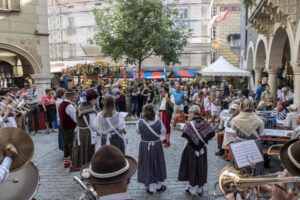Celebrating Gratitude: Thanksgiving Traditions Around the World
Reading Time: ~6 mins
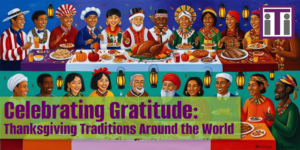
As we gear up for Thanksgiving here in the U.S., it’s a great time to explore how other cultures express their gratitude. In many places, the holidays center around harvest season, and celebrate thankfulness for the abundance gained through hard work.
From hearty feasts to vibrant festivals, here are some delightful celebrations from around the globe that honor the spirit of giving thanks!
Canada – Thanksgiving
- Date: Second Monday in October
- Origins: Canada’s Thanksgiving predates the American version, with its roots tracing back to 1578 when explorer Martin Frobisher held a feast to celebrate safe passage. Indigenous peoples also had their own harvest celebrations long before.
- Festivities: Canadians enjoy turkey dinners, much like their American neighbors, often accompanied by football games and family gatherings. It’s a time for cozy meals and enjoying the beautiful fall foliage.
Germany – Erntedankfest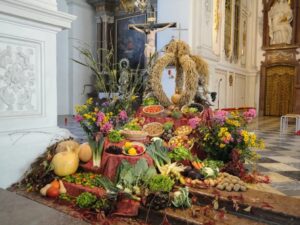
- Date: First Sunday in October
- Origins: This harvest festival, meaning “harvest thanks,” has roots in ancient agricultural practices. It’s a time to give thanks for the year’s bounty.
- Festivities: Celebrations often include a church service where a “harvest crown” made of grains and flowers is paraded. People feast on hearty dishes like roast chicken and enjoy community gatherings filled with music and dancing.
Liberia – National Thanksgiving Day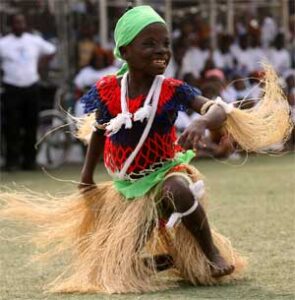
- Date: First Thursday in November
- Origins: Established by freed American slaves in the early 1820s, this holiday reflects the cultural ties to the U.S. and the desire to celebrate freedom and community.
- Festivities: Liberians celebrate with church services, feasting on local dishes like spicy roast chicken and cassava. The day is filled with music, dancing, and community gatherings, showcasing the vibrant culture.

Japan – Kinro Kansha no Hi (Labor Thanksgiving Day)
- Date: November 23
- Origins: This holiday evolved from ancient rice harvest festivals and was officially established in 1948 to honor labor and promote human rights.
- Festivities: While it’s not a huge feast day, communities celebrate with events that emphasize gratitude for workers. Children often create thank-you cards for local heroes like firefighters and police officers.
China – Mid-Autumn Festival
- Date: 15th day of the 8th lunar month (usually late September or early October)
- Origins: This festival dates back over 3,000 years, originally celebrating the harvest and the full moon.
- Festivities: Families gather to enjoy mooncakes, light beautiful floating lanterns, and appreciate the beauty of the moon, symbolizing unity and gratitude.
Ghana – Homowo Festival
- Date: Varies (usually in August)
- Origins: This festival celebrates the Ga people’s triumph over famine, marking a time of abundance after a period of hardship.
- Festivities: The festival kicks off with a month of silence and fasting, followed by vibrant celebrations filled with drumming, dancing, and a feast of traditional dishes, symbolizing joy and community resilience.
South Korea – Chuseok
- Date: 15th day of the 8th month of the lunar calendar (usually late September or early October)
- Origins: Chuseok, also known as the Korean Harvest Festival, has roots in Gabae Chigi, a traditional game played during the harvest season. It’s a time to honor ancestors and celebrate the harvest.
- Festivities: Families gather to share a feast featuring traditional dishes like songpyeon (rice cakes) and bulgogi (marinated beef). There are also rituals to pay respects to ancestors, known as Charye, where food is laid out on a table for the spirits.
India – Pongal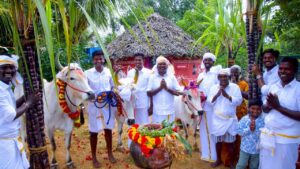
- Date: Mid-January (usually around the 14th)
- Origins: This four-day harvest festival is celebrated primarily by Tamils in South India, marking the end of winter and the beginning of the sun’s northward journey.
- Festivities: Each day has its own significance, with the main day dedicated to cooking a special dish called Pongal, made from newly harvested rice. Homes are decorated, and cattle are honored with colorful adornments.
Ethiopia – Enkutatash
- Date: September 11 (or 12 in a leap year)
- Origins: Enkutatash marks the Ethiopian New Year and the end of the rainy season, celebrating the harvest and the return of the sun.
- Festivities: Families gather for feasts featuring traditional dishes like doro wat (spicy chicken stew) and injera (flatbread). The day is filled with singing, dancing, and exchanging gifts, especially the yellow flowers that symbolize the day.
Philippines – Pahiyas Festival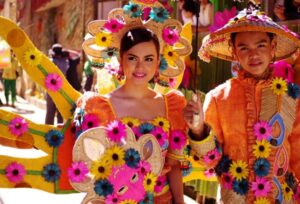
- Date: May 15
- Origins: This vibrant festival celebrates the harvest of rice and other crops, particularly in the town of Lucban. It honors San Isidro Labrador, the patron saint of farmers.
- Festivities: Homes are decorated with colorful rice wafers, fruits, and vegetables, creating a stunning display. The festival includes street parades, traditional music, and plenty of delicious local food.
Hawaii, USA – Makahiki
- Date: November to February (dates vary)
- Origins: This ancient Hawaiian festival honors the god Lono and celebrates the harvest season, marking a time of peace and feasting.
- Festivities: The Makahiki season includes games, sports, and cultural performances. Communities come together to share food, celebrate, and give thanks for the bounty of the land and sea.
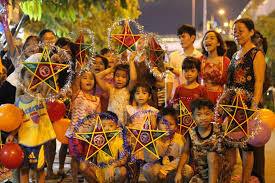
Vietnam – Tết Trung Thu (Mid-Autumn Festival)
- Date: 15th day of the 8th lunar month (usually in September)
- Origins: This festival celebrates the harvest and is also known as the Children’s Festival, honoring the moon and the harvest.
- Festivities: Families enjoy mooncakes and colorful lanterns, and children participate in parades. It’s a time for family reunions and giving thanks for the harvest.
Italy – Festa della Vendemmia & Spain – Las Fiesta de la Vendimia
- Date: Late September to early October
- Origins: This grape harvest festival celebrates the end of the grape harvest and the beginning of wine production.
- Festivities: Towns host grape stomping events, wine tastings, parades, and feasts featuring local cuisine. It’s a time for community gatherings and celebrating the fruits of the land.
Malaysia – Hari Raya Aidilfitri
- Date: Varies (based on the Islamic lunar calendar, marking the end of Ramadan)
- Origins: This festival celebrates the end of fasting during Ramadan and is a time for forgiveness and gratitude.
- Festivities: Families gather for feasts featuring dishes like rendang (spicy meat dish) and ketupat (rice cakes). It’s a time for visiting friends and family, exchanging gifts, and giving thanks for blessings.
Scotland – Lammas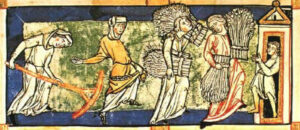
- Date: August 1
- Origins: Lammas, or Loaf Mass Day, marks the beginning of the harvest season and is rooted in ancient agricultural practices.
- Festivities: Traditionally, the first loaf made from the new harvest is brought to church for blessing. Communities celebrate with fairs, games, and feasting on local produce.
As you gather around the table this Thanksgiving, take a moment to appreciate the diverse ways people around the world express their gratitude. Whether through feasting, festivals, or family gatherings, the spirit of thankfulness unites us all! Happy Thanksgiving! 🦃✨
Interpreters and Translators, Inc. is a full-service language solutions company based in Glastonbury, Connecticut. iTi is an NMSDC-certified minority owned business. Contact iTi for all your interpreting and translation needs.

